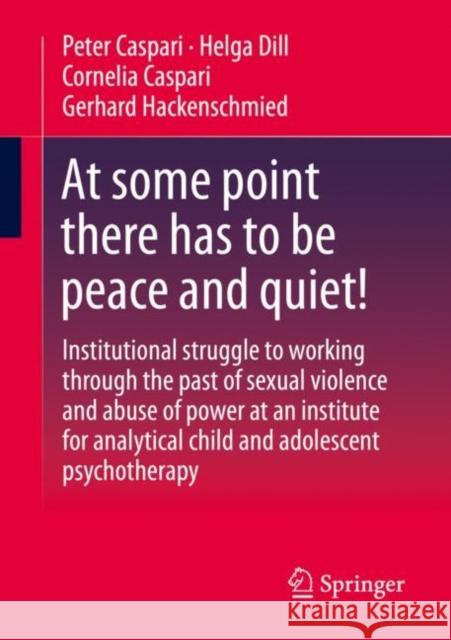At Some Point There Has to Be Peace and Quiet!: Institutional Struggle to Working Through the Past of Sexual Violence and Abuse of Power at an Institu » książka
At Some Point There Has to Be Peace and Quiet!: Institutional Struggle to Working Through the Past of Sexual Violence and Abuse of Power at an Institu
ISBN-13: 9783658397845 / Angielski / Miękka / 2023 / 237 str.
At Some Point There Has to Be Peace and Quiet!: Institutional Struggle to Working Through the Past of Sexual Violence and Abuse of Power at an Institu
ISBN-13: 9783658397845 / Angielski / Miękka / 2023 / 237 str.
(netto: 384,26 VAT: 5%)
Najniższa cena z 30 dni: 385,52
ok. 22 dni roboczych
Bez gwarancji dostawy przed świętami
Darmowa dostawa!
The book provides - for the first time in the German-speaking world - a comprehensive scientific contribution to the reappraisal of sexualized violence in a psychotherapy institute. The qualitative case study takes a look at decades of abuse of power and sexualized violence by the director of an analytical institute for children and young people. It shows that the psychotherapists involved in this system do not live up to central ideas and concepts of their profession: Silence, denial, rationalization, rejection of responsibility, and ignorance of those affected have for a long time prevented the uncovering of the acts and sustainable forms of coming to terms with them. The life of the institute is characterized by a dialectical tension between the necessity of processing and the desire for undisturbed functioning. This dynamic also proves to be analogous to the problem-solving patterns of psychotherapeutic patients. The case points to fundamental problems in the field of psychotherapy, which are primarily related to a structural power imbalance and pronounced dependency relationships both in the context of training and in the treatment setting. The findings of this empirical study are used to derive professional and organizational ethical considerations and - based on these - to formulate concrete recommendations for the prevention of sexualized violence in psychotherapy institutes.
The book provides - for the first time in the German-speaking world - a comprehensive scientific contribution to the reappraisal of sexualized violence in a psychotherapy institute. The qualitative case study takes a look at decades of abuse of power and sexualized violence by the director of an analytical institute for children and young people. It shows that the psychotherapists involved in this system do not live up to central ideas and concepts of their profession: Silence, denial, rationalization, rejection of responsibility, and ignorance of those affected have for a long time prevented the uncovering of the acts and sustainable forms of coming to terms with them. The life of the institute is characterized by a dialectical tension between the necessity of processing and the desire for undisturbed functioning. This dynamic also proves to be analogous to the problem-solving patterns of psychotherapeutic patients. The case points to fundamental problems in the field of psychotherapy, which are primarily related to a structural power imbalance and pronounced dependency relationships both in the context of training and in the treatment setting. The findings of this empirical study are used to derive professional and organizational ethical considerations and - based on these - to formulate concrete recommendations for the prevention of sexualized violence in psychotherapy institutes.











